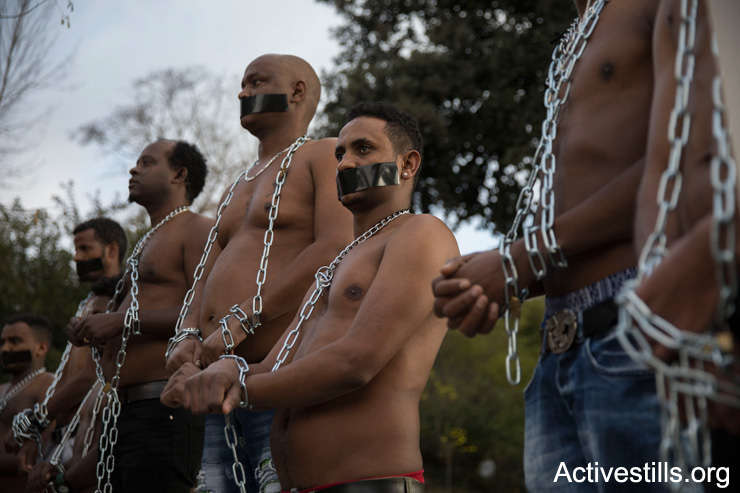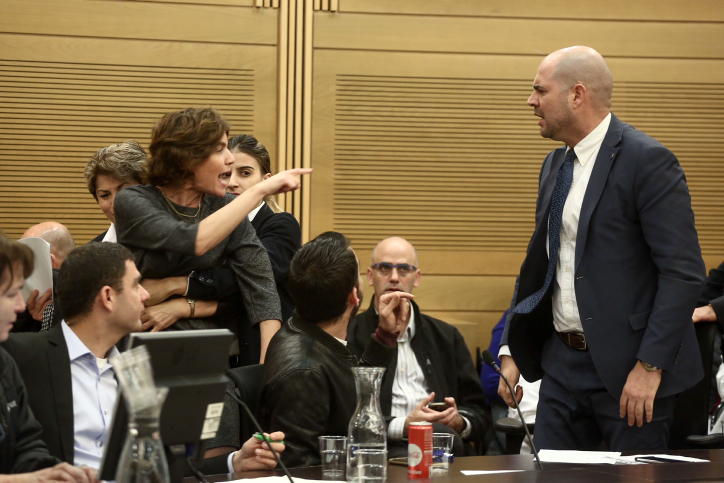Over 140 teachers sign an open letter calling to stop the deportation of asylum seekers. Meanwhile, former education ministers and Israel Prize winners warn against an ‘injustice that contradicts Jewish values.’

Over 140 teachers signed an open letter calling on the government to change its decision to deport the asylum seekers to Rwanda and Uganda. Another 190 leaders in Israel’s education system, including former education ministers, also published a letter calling on Education Minister Naftali Bennet to intervene and stop the deportations.
In the teachers’ letter, addressed to the prime minister, the education minister, and members of the governing coalition, they write:
It is on us, teachers, to set an example for our students, the very students who we educate to be socially involved and concerned with human freedom and dignity.
We call on you to change your decision; otherwise history will judge us with the utmost severity for committing this terrible injustice. Now is the time to show humanistic leadership, based on Jewish values, and to set an example for the world.
I spoke this morning with Yifat Ben Dov, a literature teacher at Maccabim-Re’ut High School, who helped spearhead the letter. A resident of Modi’in, an Israeli city near the Green Line, Ben Dov said that she decided to draft the letter, together with Tali Mizrahi, an elementary school teacher from Be’er Sheva, a week after more than 50 school principals issued their own letter to the prime minister and education minister, calling on them to stop the deportations. Ben Dov asked to join the principals’ letter but was turned down, so she and Mizrahi decided to take action.
“Part of our goal is to make sure teachers don’t fear speaking their minds,” Ben Dov said. “We wanted to do something that would be noticed, so we asked the teachers to sign their names. One of the problems is that educators are afraid to express their opinions. I saw this when we began to gather signatories for the letter. There was a fear of harassment from the principals and the Education Ministry. For this reason, some teachers did not want to list the name of the schools where they work.”
Ben Dov called on more teachers to sign the letter. “We are at a critical moment. As educators, we have the public responsibility to take a stand when refugees are on the brink of being deported to their possible death. We must try to influence the government to change this fatal decision. Teachers have the power to influence. Don’t be afraid to take a stand openly.”

Over 180 educators and academics also signed a letter addressed to the Education Minister on Sunday, calling on him to halt the deportations. The signatories included former education ministers, winners of the Israel Prize for Education, former members of Knesset, and the presidents of major Israeli educational institutions. In their letter, they wrote:
As long as [Israel] has failed to clarify in a basic, objective, and credible way the cases of all those who have asked to be recognized as refugees according to the international agreements on which Israel is a signatory, any form of deportation, ‘voluntary’ or by force, is unjust and immoral.
As parents and teachers responsible for educating generations of students, we cannot stand idly by in the face of this act that will endanger the lives of the deportees, and which is an injustice that contradicts both human and Jewish values.
We identify with the distress of the residents of south Tel Aviv, and of any place in the country that has absorbed large numbers of foreign residents. Yet we are convinced that there are more humane and just ways to deal with this problem. The connection between the real distress of marginalized groups living in poor neighborhoods with the fact that they must absorb even more marginalized populations is cynical and wrong.
The signatories added: “We must not forget what our parents and grandparents endured just seventy years ago, when they knocked on the doors of the nations, which were slammed in their faces. We are not comparing our actions to those of the Nazis — God forbid. We are comparing our actions to those of the world and of the authorities that did not aid to the persecuted, and who turned their backs when it was still possible to save many lives. The claim that the refugees arrived here illegally does not make the deportations more just.”

In the meantime, the argument about secret agreements between Israel and Rwanda, as well as other countries that have agreed to accept the deported refugees continues. Despite Rwanda’s strong public denials of the existence of an agreement, Interior Minister Aryeh Deri claimed during a session of the Knesset Internal Affairs Committee that there is an agreement with a third country in Africa, to which Israel is permitted to deport the refugees by force.
Israel claims that the asylum seekers are being deported to a safe country where they will receive legal status. However, hundreds of testimonies gathered by refugee aid organization reflect a different reality entirely. Only a very small percentage of asylum seekers deported by Israel to Rwanda have remained there and received legal status. Nearly every asylum seeker who arrived in Rwanda stayed for only a few days before being forced to continue their journey to other countries, without being offered money or documents.
The testimonies make it clear that asylum seekers deported from Israel are vulnerable to exploitation, humiliation, human trafficking, forced imprisonment, bribery, and violence. Some have fallen into the hands of kidnapping gangs, while others have been executed by ISIS. Many who attempt the dangerous trip to reach Europe die along the way, on land or at sea.
Yael Marom is Just Vision’s public engagement manager in Israel and a co-editor of Local Call, where a version of this article was originally published in Hebrew.
